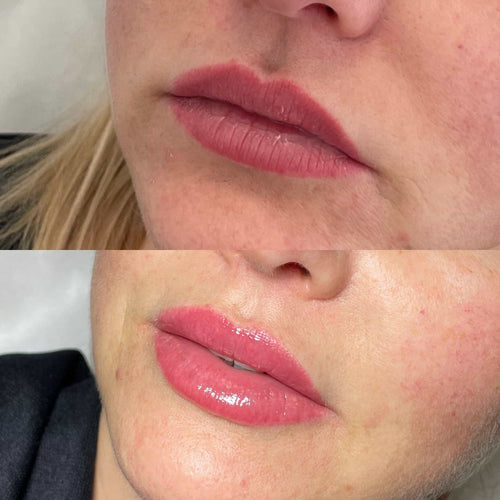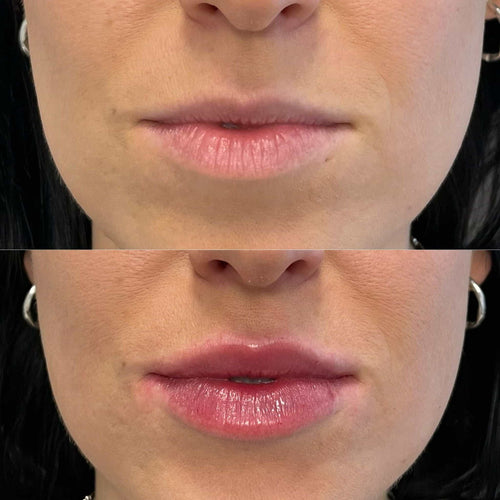Schedule a Dermal Filler Session with Dr. Laura Geige
Legal Age Requirements
US Federal Law
In the United States, there are no specific federal laws dictating a minimum age for cosmetic procedures like lip filler injections.
However, individual states may have their own regulations regarding age restrictions for cosmetic procedures. It’s crucial to check the specific laws in your state.
Most medical professionals, including plastic surgeons and dermatologists, adhere to a general guideline of requiring patients to be at least 18 years old for cosmetic treatments. This is often based on legal considerations related to informed consent and parental permission.
Some states may allow minors to undergo certain cosmetic procedures with parental consent, while others may have stricter regulations.
When considering lip fillers or any other cosmetic procedure as a minor, it’s essential to:
-
Consult with parents or legal guardians and discuss the potential risks and benefits openly and honestly.
-
Seek out a board-certified dermatologist or plastic surgeon who is experienced in treating minors and can provide comprehensive guidance.
-
Ensure that any procedure performed meets ethical medical standards and prioritizes the health and well-being of the minor.
State-Specific Regulations
In most states in the United States, there’s no specific legal age requirement for lip fillers. However, this doesn’t mean anyone can get them at any age.
The key factor is state-specific regulations regarding cosmetic procedures and the practitioner’s licensing.
While many states don’t have a minimum age, most require individuals to be at least 18 years old to consent to medical procedures. This includes cosmetic treatments like lip fillers.
Some states may have additional regulations or stricter age requirements. For example, some states might require parental consent for minors who wish to undergo cosmetic procedures.

It’s crucial for anyone considering lip fillers, regardless of age, to consult with a licensed and qualified medical professional.
They can assess individual needs, discuss potential risks and benefits, and ensure the procedure is appropriate given their age, health condition, and desired outcome.
Remember, safety and responsible decision-making should always be paramount when considering any cosmetic treatment.
Medical Considerations
Maturity of Facial Structure
When considering lip filler injections, age is a significant factor that goes beyond legal requirements. It’s crucial to understand the interplay between maturity of facial structure and medical considerations for safe and effective treatment.
Facial development continues well into adulthood, typically reaching completion around the mid-twenties. The bones, muscles, and soft tissues undergo significant changes during these years, ultimately shaping the overall appearance of the face. Lip filler injections can enhance and modify the shape and volume of the lips, but injecting them prematurely could potentially disrupt this natural process.
For younger individuals whose facial structure is still developing, lip fillers might not produce the desired results. The injected filler could migrate or distort as the underlying bone and tissue continue to grow, leading to an unnatural appearance. Additionally, there’s a higher risk of complications like bruising, swelling, and infection in immature skin.
Medical professionals generally recommend waiting until at least 21 years old before considering lip fillers. By this age, facial development has largely completed, minimizing the chances of adverse effects.
It’s important to consult with a board-certified dermatologist or plastic surgeon who specializes in facial aesthetics. They can thoroughly evaluate your individual case, assess your facial structure maturity, discuss your expectations, and determine if lip fillers are an appropriate treatment option for you.
Remember, the decision to get lip fillers should be made after careful consideration of both aesthetic goals and potential risks. Prioritizing safety and a natural-looking outcome is paramount.
Underlying Health Conditions
Medical considerations and underlying health conditions play a crucial role in determining an appropriate age for lip filler treatments.
It’s important to understand that lip filler procedures, while generally considered safe when performed by qualified professionals, involve injecting foreign substances into the body. This means individuals with certain medical conditions or taking specific medications may be at increased risk of complications.
Book a Dermal Filler Consultation at It’s Me and You Clinic with Dr. Laura Geige
**Here are some key medical considerations**:
* **Age:** While legal guidelines vary, most practitioners recommend waiting until late teens or early twenties for lip filler treatments. This allows the facial structures to fully develop and mature.
* **Health Conditions:** Individuals with *autoimmune disorders*, *bleeding disorders*, *active infections*, *skin conditions* like eczema or psoriasis, or *allergies to lidocaine or hyaluronic acid* should consult their doctor before considering lip fillers.
* Pregnancy and Breastfeeding**: Women who are pregnant or breastfeeding should avoid lip filler treatments as the safety for both mother and child has not been established.
* **Medications:** Certain medications, like blood thinners, can increase the risk of bruising or bleeding after the procedure. It’s essential to inform the practitioner about all medications you are taking.
It’s important to have a thorough consultation with a qualified and experienced medical professional to assess individual suitability for lip fillers. They will consider your medical history, skin type, desired outcome, and potential risks to ensure safe and effective treatment.
Remember, **prioritizing health and safety is paramount** when making decisions about cosmetic procedures.
Reserve Your Dermal Filler Consultation with Dr. Laura Geige at It’s Me and You Clinic
Parental Consent

Minors and Injectable Fillers
Injectable fillers, such as hyaluronic acid, are popular cosmetic treatments used to enhance facial features, including lips. However, access to these procedures for minors raises ethical and legal concerns.
Parental consent laws vary by jurisdiction, but generally, minors require parental or guardian consent for medical procedures, including cosmetic ones. The age at which a minor can legally consent to medical treatment without parental involvement also varies by location.
Here’s a breakdown of key considerations regarding parental consent and injectable fillers for minors:
* **Legal Requirements:**
-
Most countries have laws requiring parental consent for minors under 18 to undergo medical procedures, including cosmetic ones.
-
Specific age requirements for consent vary by jurisdiction. Some states or provinces may allow minors as young as 16 or 17 to consent to certain medical procedures, while others require parental consent until the age of 18.
* **Ethical Considerations:
Even when legally permissible, there are ethical concerns about injecting fillers into minors:
-
Developmental Changes:** Facial features continue to develop until adulthood. Injecting fillers prematurely could interfere with natural growth and development.
-
Psychological Impact:** The pressure to conform to societal beauty standards can be especially intense for young people. Injectable fillers may contribute to body image issues and low self-esteem.
-
Risks and Complications:** Like any medical procedure, filler injections carry risks, such as infection, allergic reactions, and uneven results. Minors may be more vulnerable to these complications due to their developing bodies.
* **Open Communication and Education:
If a minor expresses interest in lip fillers, it’s essential for parents or guardians to engage in open and honest conversations about the risks and benefits.
-
Encourage critical thinking about beauty standards and body image.
-
Discuss realistic expectations regarding results and potential complications.
-
Emphasize that natural beauty is valuable.
Ultimately, the decision of whether or not to allow a minor to receive injectable fillers should be made on a case-by-case basis, taking into account the individual child’s maturity, understanding, and the ethical and legal considerations involved.
Exceptions to Parental Consent
Parental consent laws regarding cosmetic procedures like lip fillers vary significantly depending on the location and specific circumstances. Generally, minors require parental or guardian consent for medical treatments, including non-surgical cosmetic procedures.
The age at which a minor can legally consent to cosmetic procedures without parental involvement also differs. In some jurisdictions, it may be 16 years old, while others set the threshold at 18 years old.
Exceptions to parental consent laws often exist in cases of emergencies or when the procedure is deemed medically necessary. For example, a minor experiencing severe acne might require laser treatment for which parental consent could be waived if it’s considered essential for their physical and mental well-being.
It’s crucial for minors seeking lip fillers to understand and comply with their local laws regarding parental consent. Consulting with a legal professional or the relevant medical board can provide clarity on specific requirements in their area.
Additionally, even if a minor meets the age requirement for consent, it’s advisable for parents to be involved in the decision-making process. Open communication and discussion about the potential risks and benefits of cosmetic procedures can help ensure that minors make informed choices about their health and appearance.
Raindrops and Ribbons Zoe Mallett Coaching Elizabeth Joy Photo Mind Plus Motion Hopeless Book
- Sculptra Surrey – Collagen Stimulation Therapy Near Rowledge, Surrey - December 31, 2024
- How Old Do U Have To Be For Lip Filler - December 17, 2024
- Chin Augmentation With Chin Filler Near Abinger, Surrey - December 12, 2024
